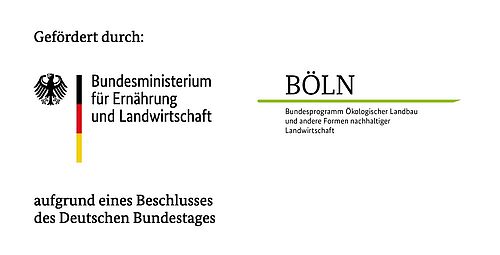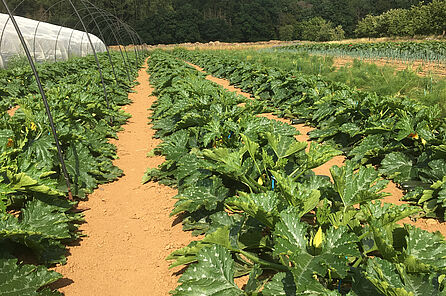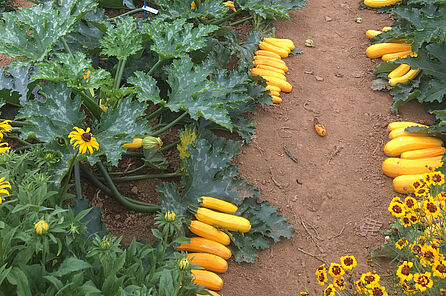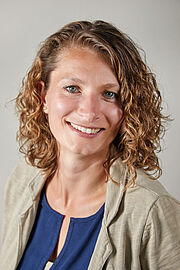Weatherproof courgettes: The project ‘QCuK‘ on the quality of cucurbitaceous fruits in a changing climate
Project period
2023 - 2025
Climate change is a major challenge for agriculture. With more frequent weather extremes, crops such as courgettes, pumpkins and cucumbers are likely to experience more frequent and prolonged heat and drought stress. This can cause crop losses as well as changes in fruits metabolism and composition. A significant alteration in plant primary and secondary metabolism is well known under extreme environmental conditions.
In addition to altering the nutritional value of the fruit, this reaction could also lead to an altered taste due to the accumulation of certain plant constituents. Consequently, this can result in a loss of quality and overall yield. Therefore, an important goal of the QCuK project is to identify varieties that will still enable stable yields with consistent quality in the future and develop methods, which allows to breed new varieties under stress conditions. With funding from the BMEL/BÖL, the QCuK project will start March 2023 at the Department of Vegetable Crops. In collaboration with researchers from horticultural and nutritional sciences and with biodynamic vegetable breeders and producers, courgette varieties will be investigated for their drought tolerance over a period of three years. Growth, yield and also fruit quality will be examined. Particularly the project will focus on the taste of fruits and on an altered composition of plant constituents under drought stress, which can influence both the taste and the nutritional quality of the fruit.
Under the coordination of Dr. Simone Röhlen-Schmittgen at the Geisenheim University, various cultivars and hybrid varieties will be investigated for their drought tolerance over a period of three years as part of the QCuK project with a total of five partners. At the Institute of Vegetable Crops at Geisenheim University, various zucchini cultivars and lines will be characterized under both good and less good irrigation conditions, in greenhouse trials as well as in field cultivation. The aim is to identify physiological traits for increased drought stress resistance in different cultivars. For this purpose, phenological, spectral and yield physiological parameters will be recorded and evaluated. The steps of the experimental set-up from seedling cultivation to field cultivation will be carried out in an organic management according to the EC organic regulation.
At Forschungszentrum Jülich, IBG-4 Institute of Bio- and Geosciences (IBG-4), Bioinformatics, various zucchini cultivars will be investigated for their drought tolerance at the young plant stage under the direction of Dr. Anika Wiese-Klinkenberg. The focus is on the effects of drought stress on gene expression, especially on the biosynthetic pathway of secondary plant compounds. In this way, parameters will be identified that enable early selection of suitable varieties. In addition, insights will be gained into which zucchini cultivars, might undergoes stronger ingredient changes during fruit formation. The established methods for non-invasive phenotyping of growth, morphology and physiology at the young plant stage allow early characterization for breeding approaches.
At the Department of Crop Sciences, Division of Quality and Sensory of Plant Products at Georg-August-Universität Göttingen, the product quality and food safety of zucchini varieties will be characterized under the direction of Prof. Dr. Susanne Neugart. Accompanied by Dr. Tobias Pöhnl, the effects of stress- or weather-related changes on the quality and especially on the taste of zucchini fruits will be investigated. Plant constituents such as valuable vitamins and flavonoids or cucurbitacin bitter compounds will be analyzed and evaluated. The main focus is on future food safety and ensuring tasty, healthy, digestible and bitter-free fruits.
At the Queckbrunnerhof Training and Experimental Farm of the Dienstleistungszentrum Ländlicher Raum Rheinpfalz, a large-scale comparison of varieties under practical conditions of commercial vegetable production is being conducted under the direction of Dr. Sebastian Weinheimer. Phenotypic and physiological characteristics of different varieties and lines are recorded at leaf and fruit level under two different irrigation regimes. The entire trial is designed according to the specifications of the Bioland Farmers' Organization, according to whose guidelines the trial farm has been certified for more than 25 years. The aim is to develop a variety recommendation for farmers that takes into account both product quality under drought stress and the sustainable use of resources.
At the three locations Bingenheim (Hesse), Sudershausen (Lower Saxony) and at the Oldendorfer Saatzucht (Lower Saxony) of Kultursaat e.V. a cultivation trial of variety and breeding populations will be carried out under practical conditions of biodynamic vegetable breeding. Under the direction of M.Sc. Michael Fleck, established on-farm selection procedures will be used to characterize and select drought stress tolerant cultivars/lines under two irrigation regimes. In addition to phenotypic traits at the leaf and fruit level, agronomic traits, such as yield, harvestability, health, and qualitative traits, such as fruit appearance, storability, and taste, will be recorded. The cultivation and trial steps are carried out according to the guidelines of the Demeter Association and thus at the same time according to the EU regulations for organic agriculture. The aim is to further develop breeding populations under drought-stress-induced conditions in order to provide new varieties for organic farming in biodynamically managed breeding gardens that will enable stable crop yields with good product quality in future climate scenarios.
QCuK will therefore help to support the breeding of climate-adapted and high-performing zucchini plants as well as open-pollinated varieties in organic horticulture, strengthen product quality and food safety, and assess quality-altering losses as consequences of climate change.
founded by:

The project is supported by funds of the Federal Ministry of Food and Agriculture (BMEL) based on a decision of the parliament of the Federal Republic of Germany via the Federal Office for Agriculture and Food (BLE) under the Federal Programme for Ecological Farming.






